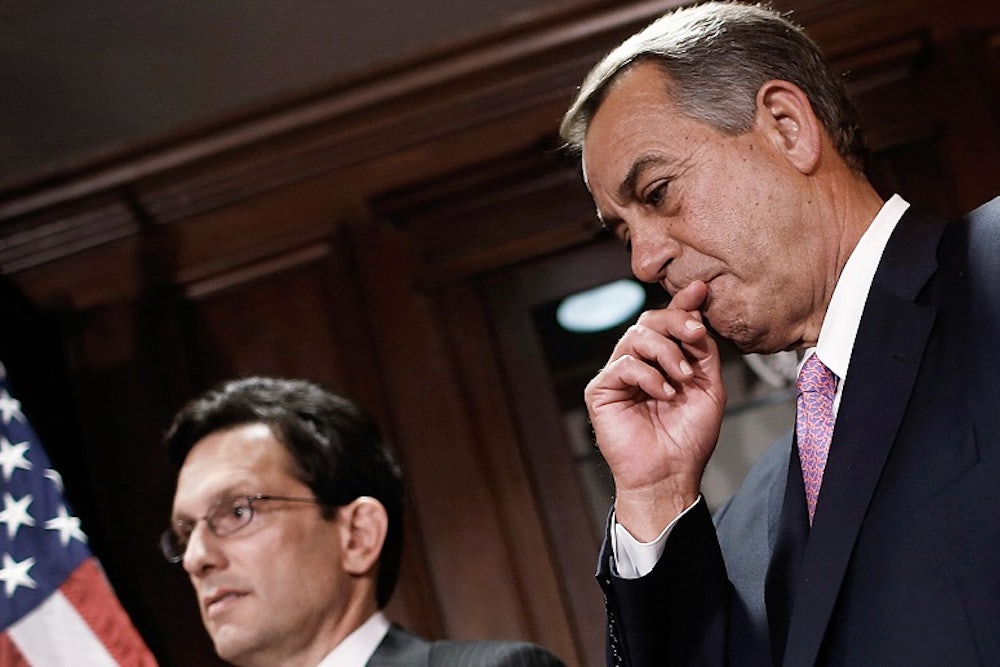A Pew Research-USA Today survey released on Monday finds that Americans' number one priority remains jobs. And yet, while Democrats have fought for increased government spending to boost the recovery, Americans are planning to reward Republicans in November—even though they have still not offered a credible jobs plan.
By a 43 to 39 margin, Americans trust Republican leaders in Congress over the Obama administration on economic policies to boost the economy. On whether they would currently vote for a generic Democrat or Republican candidate for Congress, Americans choose the GOP 47 percent to 43 percent—a huge gap given the Democratic turnout problem in midterm elections. The survey also asked whether Americans would rather the next president continue the same policies as President Obama or choose a different path. Nearly two-thirds (65 percent) said they wanted different policies, with just 30 percent hoping for a continuation of the Obama-era agenda. These gaps are likely the result of Democratic policies taking the blame for the weak recovery. And while the recovery certainly could be much stronger, its weakness is the result of Republican obstruction, not the Democratic agenda.
The Great Recession left a huge hole in aggregate demand—demand from consumers for goods and services. As workers were laid off, they cut back on spending. That, in turn, caused companies to lay off more workers, who cut back on their spending, leading to further layoffs. This negative feedback loop sent unemployment skyrocketing to more than 10 percent, and we still have not fully recovered. The government has tools at its disposal to fill this demand deficiency: fiscal or monetary stimulus. Fiscal stimulus is increased government spending while monetary stimulus is loosening of Fed policy.
We tried both—and both succeeded, to a point. The Federal Reserve has kept interest rates at zero since 2008 and has used unconventional tools like quantitative easing, which is the large-scale purchase of assets such as U.S. treasuries and mortgage-backed securities, and forward guidance, which is qualitative and quantitative language the Fed has offered the public as a guide to future policy. The purpose of both policies was to spur investment and boost the recovery. The American Recovery and Reinvestment Act—also known as the stimulus—provided more than $700 billion to the economy between 2009 and 2011. The White House argues that this saved 1.6 million jobs per year from 2009 to 2012. That number may be inflated due to monetary offset—the Fed would have done more in the absence of the stimulus. But former Fed chair Ben Bernanke has reiterated that the Fed cannot fully offset fiscal policy, meaning the stimulus had some positive impact on the economy.
In the debate over whether to apply fiscal or monetary stimulus, the GOP chooses neither. Facing a massive hole in aggregate demand, Republicans have offered the same supply-side agenda as always: tax cuts, spending cuts, and deregulation. These are not macroeconomic policies for filling a short-term hole in demand and spurring a recovery. Only after the economy returns to sustainable, full employment—something we haven’t achieved in nearly 20 years—should we look at supply-side policies to boost growth. That includes removing occupational licensing standards across the country, reforming Social Security Disability Insurance, and deregulating the housing market. But that's still years away. The economy is operating well below capacity and long-term unemployment remains elevated. Jobs are still the number one priority for most Americans.
The government should continue filling the hole in demand. The Federal Reserve is doing so with its zero interest rate policy, but Congress has done the opposite—sequestration has made the hole larger. House Majority Leader Eric Cantor has proposed many bills to cut regulations. Senate Republicans proposed their own jobs plan that included commitments to tax reform, austerity and repeal of Obamacare. These are fundamentally not jobs plans though. To qualify as one, the proposal must fill the hole in demand and that can only be done with fiscal or monetary stimulus. Republicans are offering neither. In a rational world, this hole in the GOP agenda would cripple them at the ballot box, but Republicans remain in excellent shape for the midterm elections.
